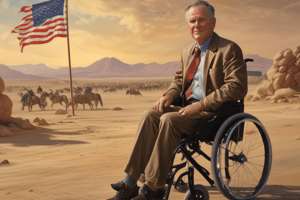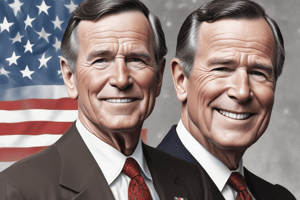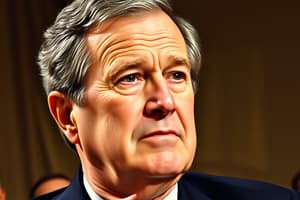Podcast
Questions and Answers
What event significantly reshaped President Bush's global agenda during his presidency?
What event significantly reshaped President Bush's global agenda during his presidency?
- The September 11 terrorist attacks (correct)
- The fall of the Berlin Wall
- The economic recession of 2008
- Hurricane Katrina
Which policy was introduced by Bush as part of his response to emerging threats?
Which policy was introduced by Bush as part of his response to emerging threats?
- The Bush Doctrine (correct)
- The Clean Air Act
- The Human Rights Act
- The Affordable Care Act
What was a significant criticism of the Iraq War initiated during Bush's presidency?
What was a significant criticism of the Iraq War initiated during Bush's presidency?
- It was justified without sufficient evidence. (correct)
- It was too costly for the economy.
- It had popular support from most Americans.
- It improved relations with Middle Eastern countries.
Which act expanded surveillance and law enforcement powers under Bush's presidency?
Which act expanded surveillance and law enforcement powers under Bush's presidency?
What was the purpose of the No Child Left Behind Act enacted during Bush's presidency?
What was the purpose of the No Child Left Behind Act enacted during Bush's presidency?
How did the creation of the Department of Homeland Security address domestic threats?
How did the creation of the Department of Homeland Security address domestic threats?
Which of the following was part of Bush's strategy to promote global democracy?
Which of the following was part of Bush's strategy to promote global democracy?
What was a major outcome of the tax cuts implemented during Bush's presidency?
What was a major outcome of the tax cuts implemented during Bush's presidency?
What was a significant economic challenge faced by Bush during his presidency?
What was a significant economic challenge faced by Bush during his presidency?
Which program did Bush support to address the 2008 financial crisis?
Which program did Bush support to address the 2008 financial crisis?
What was one of the major outcomes of Bush's rejection of the Kyoto Protocol?
What was one of the major outcomes of Bush's rejection of the Kyoto Protocol?
Which key policy area did Bush's presidency significantly shape regarding global security?
Which key policy area did Bush's presidency significantly shape regarding global security?
Which two Supreme Court justices were appointed by Bush during his presidency?
Which two Supreme Court justices were appointed by Bush during his presidency?
How did Bush's policies contribute to political polarization?
How did Bush's policies contribute to political polarization?
Which of the following was a criticism of Bush regarding economic policy?
Which of the following was a criticism of Bush regarding economic policy?
What remains a point of contention in public perception of Bush's presidency?
What remains a point of contention in public perception of Bush's presidency?
Flashcards
The War on Terror
The War on Terror
George W. Bush's approach to foreign policy that focused on preventing terrorist attacks and using preemptive force against potential threats, often with strong military action.
Tax Cuts
Tax Cuts
The economic strategy of cutting taxes to stimulate economic growth, often associated with Republican administrations.
Medicare Expansion
Medicare Expansion
The expansion of the Medicare program to provide prescription drug coverage for seniors.
Crisis Management
Crisis Management
Signup and view all the flashcards
Political Polarization
Political Polarization
Signup and view all the flashcards
U.S. Military Presence in the Middle East
U.S. Military Presence in the Middle East
Signup and view all the flashcards
Bush's Impact on the Supreme Court
Bush's Impact on the Supreme Court
Signup and view all the flashcards
Bush's Legacy
Bush's Legacy
Signup and view all the flashcards
War on Terror
War on Terror
Signup and view all the flashcards
Iraq War
Iraq War
Signup and view all the flashcards
Bush Doctrine
Bush Doctrine
Signup and view all the flashcards
Global Democracy Promotion
Global Democracy Promotion
Signup and view all the flashcards
USA PATRIOT Act
USA PATRIOT Act
Signup and view all the flashcards
Department of Homeland Security
Department of Homeland Security
Signup and view all the flashcards
Tax Cuts under Bush
Tax Cuts under Bush
Signup and view all the flashcards
No Child Left Behind
No Child Left Behind
Signup and view all the flashcards
Study Notes
Bush Jr. (2001-2009) Global Policies: War on Terror and Foreign Affairs
- 9/11 and the War on Terror: The September 11, 2001 terrorist attacks significantly shaped Bush's presidency. The War on Terror focused on Afghanistan (2001) and Iraq (2003)
- Iraq War: The invasion was justified by claims of weapons of mass destruction (WMDs) and regime change. This led to prolonged conflict and regional instability, questioning U.S. intelligence.
- Bush Doctrine: A policy of preemptive action, aiming to prevent threats before they arise. It presented U.S. foreign policy as a mission to promote democracy and combat terrorism.
- Global Democracy Promotion: Bush advocated for democratic spread, particularly in the Middle East, linking it to long-term global security. Results were mixed, with some success but criticism for its approach.
- Key Relationships: Strong ties with the UK under Tony Blair. Tarnished relations with countries opposed to the Iraq War (France and Germany). Increased support for Israel, focusing on Middle Eastern geopolitics.
- Creation of the Department of Homeland Security (2002): Consolidated agencies to combat domestic threats.
Bush Jr. (2001-2009) Domestic Policies: Security, Economy, and Social Issues
- USA PATRIOT Act (2001): Expanded surveillance and law enforcement powers in response to terrorism. This act was controversial for its perceived effect on civil liberties.
- Tax Cuts: Major tax cuts in 2001 and 2003 aimed at revitalizing the economy. Critics argued these disproportionately benefited the wealthy, leading to increased deficits.
- No Child Left Behind (2002): An overhaul of public education emphasizing standardized testing. This was criticized for its burden on schools.
- Medicare Prescription Drug Benefit (2003): Expanded Medicare to cover prescription drugs. This was significant but criticized for its high cost and lack of price controls.
- Leadership During Crises: 9/11 rallied national and international support initially. Hurricane Katrina (2005) highlighted shortcomings in federal disaster response.
Bush Jr. (2001-2009) Other Policies
-
Religious Influence: Bush's Christian faith influenced rhetoric and policies, causing concern regarding separation of church and state.
-
Economic Challenges: Faced a recession at the beginning and the 2008 financial crisis towards the end of his term. Supported the Troubled Asset Relief Program (TARP) which sparked a debate about government bailouts.
-
Environmental Policies: Rejected the Kyoto Protocol, preferring domestic energy production.
-
Polarization and Public Perception: Bush's policies and rhetoric amplified political divisions. Approval ratings fluctuated significantly following 9/11, the Iraq War, Hurricane Katrina, and the financial crisis.
-
Judicial Appointments: Appointed conservative justices, John Roberts and Samuel Alito, to the Supreme Court.
-
Economic Legacy: Tax cuts and financial interventions shaped fiscal policy for years. Critics cited increasing deficits and inequality during his tenure.
-
Middle East Relations: Bush's actions in Iraq and Afghanistan shaped the region, with a combination of successes and lasting failures.
-
Public Perception: Bush's legacy remains controversial, where supporters saw him as decisive, while critics viewed his actions as overreaching, poorly managed, and resulting in unintended consequences.
-
Key Takeaway Framework: Bush's presidency can be categorized through security (War on Terror), economic policies (tax cuts, Medicare expansions, crisis management), and polarization (deepening political divisions).
Studying That Suits You
Use AI to generate personalized quizzes and flashcards to suit your learning preferences.




